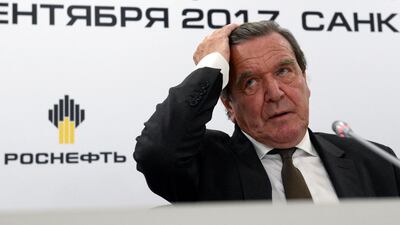Live updates: follow the latest news on Russia-Ukraine
The European Parliament is ready to call for former German chancellor Gerhard Schroeder to be blacklisted if he does not quit as a board member of Russian state-owned oil company Rosneft.
The draft resolution, which also applies to Karin Kneissl, a former Austrian foreign minister under the government of Sebastian Kurz, is supported by the four biggest political groups in the EU assembly, but is still subject to minor changes.
The EU Parliament "notes that former politicians ... have recently resigned from their positions in Russian firms and strongly demands that others, such as Karin Kneissl and Gerhard Schroeder, do the same", the draft document says.
The text is expected to be adopted later on Thursday. It is not binding, but it represents a significant pressure on the EU to act against Europeans seen as being close to the Kremlin.
Mr Schroeder is under increasing scrutiny in Germany after he failed to distance himself from Russian President Vladimir Putin after the invasion of Ukraine in February.
On Thursday the country removed his official perks, assessing that he has failed to uphold the obligations of his office by refusing to sever ties with Russian energy giants.
It is custom for Germany's leaders to get a state-funded office when they leave government, but the three parties that make up current Chancellor Olaf Scholz's governing coalition agreed a parliamentary motion to close Mr Schroeder's.

"The coalition parliamentary groups have drawn consequences from the behaviour of former chancellor and lobbyist Gerhard Schroeder in view of the Russian invasion of Ukraine," the parliament decided.
"The office of the former chancellor shall be suspended," it said, noting that Mr Schroeder "no longer upholds the continuing obligations of his office".
German media has reported that the 78-year-old earns sums from jobs at Russian state-owned energy companies that dwarf the €400,000 ($420.859) the German state spends on the office.
Mr Schroeder is also chairman of the shareholders' committee of the company in charge of building the Nord Stream 2 pipeline between Germany and Russia, a project now shelved.
So far the EU has agreed to freeze the assets of hundreds of oligarchs and officials linked to the Kremlin, as part of steps against Russia for its invasion of Ukraine, but has refrained from directly targeting Europeans with top jobs at Russian companies that are seen as supporting the military operation in Ukraine.
The parliament urges "to extend the list of individuals targeted by EU sanctions to the European members of the boards of major Russian companies and to politicians who continue to receive Russian money".
"By serving in top positions of Kremlin-affiliated corporations, the former German chancellor Gerhard Schroeder is de facto closely co-operating with Russia," said centre-right politician Markus Ferber, who helped to draft the resolution.
A spokesman for the EU foreign policy department had no comment on the parliament's resolution but emphasised that individual sanctions would need evidence and the backing of all 27 governments.


